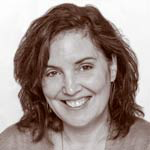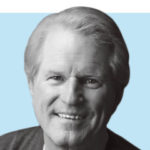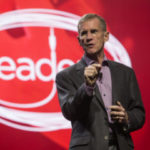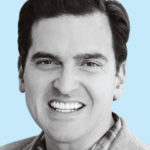
“Like a horse with blinders on.” That’s how Jay Weintraub described the experience of leaving his job as a successful Internet advertising executive to launch a meeting for hundreds of his colleagues with no prior planning experience.
Attendance at his first event — LeadsCon, the Lead Generation Conference, held at The Palms in Las Vegas in 2008 — was nearly double what he’d expected, and it tripled the following year. Four years later, Weintraub sold LeadsCon, and shortly after co-founded another research and event-planning business, Grow.co, with Adam Lovallo (although Weintraub remains a program chair for LeadsCon).
Despite his successes, the University of Pennsylvania grad still considers himself a “beginner” who relies on the tight execution of ideas to propel his business forward. Originally from San Antonio, the 38-year-old Weintraub now lives and works in New York City, where he took a few moments recently to talk to Convene about unexpected mentorship, identifying new professions around which to build events, and the challenges and opportunities of engaging Generation Y.
What exactly is lead generation?
It’s essentially an offshoot of the direct marketing world. You could say it’s the online equivalent of direct-response postal mail. It just created a different ability to target users and find hand-holders, or hand-raisers, I should say, in an immediate fashion. So instead of handing out a bunch of mail and hoping people might call, all of a sudden you had a very tractable medium. Not only was it tractable, but people could express their interest right that second. It went from “I’m buying lists” to “I’m buying people who have actually said, ‘I’m interested.’”
Almost every company has been doing it in some form, even if they know it or not. The big change as we shifted from a direct-mail world to online was that instead of finding people who might become leads, you could now reach out to those who have expressed interest in your product or service. Instead of buying a list of names and having to spend money on postal mail, or placing an ad in the Yellow Pages — but not knowing if it was effective — a company could buy only the names of those who specifically entered their information to learn more. Most transformational about the shift to online was the ability for a company to get this information in near real-time.
What drew you from the world of Internet advertising to founding LeadsCon?
As with many life changes, there’s never one specific reason; there’s usually a handful of equally significant ones. At the time, my industry was coming under pressure from the FTC [Federal Trade Commission], which in many ways governs what marketers can and can’t say. They had singled out a particular company and said, “We’re investigating this company because of their lead-generation practices.” For people who were in our industry, we’d never thought [of that company] as being in lead generation. I looked at that as, “Hey, there’s a problem here. People don’t understand what we do.”
I’m always hesitant to toot my own horn, but people considered me very knowledgeable in the world of online lead generation. That’s what I knew. I certainly didn’t understand the world of events, gatherings, meetings, or anything on that spectrum.
I also had started to attend some events and to see the value they offered. I noticed that many of the companies that I’d considered part of the lead-generation world were often exhibiting, yet they were never onstage — they were never speaking. To me, that suggested that there was a potential need in the marketplace, especially if we wanted to be more issues-driven. I realized I know a lot of people. Why shouldn’t it be me that does this, even though I’m not an event expert? I knew that it wasn’t an original idea, but I also knew it was going to happen eventually. If somebody else came out and did this, and it wasn’t me, I would have felt like I really missed out.
I’ll be honest, too: Today I have twins, I’m married, and I live in an incredibly expensive city. At the time, I was living in Los Angeles and I was completely unattached, so it made taking the kind of risk — from leaving a stable job to starting a different one — a lot less scary.
How long had you been working in your field at that point?
In my seventh year — seven years in many professions is nothing, but given that the field was Internet advertising, seven years almost makes you too old.
Tell us about your inaugural event.
My first event was April 2008. I’ve described the process as being like a horse with blinders on. I think ignorance really is bliss, and I didn’t actually understand the consequences if I failed. I signed a contract with each hotel venue that guaranteed them a certain number of rooms and a certain minimum of food-and-beverage. So I owed those hotels more money, many times more than I was worth. If I had failed, or had to cancel the contract, I would have been personally bankrupt.
I think if I’d actually understood the consequences, I would’ve been really scared. Then you sort of say, “Wait a second, all it takes is this many people and this many sponsors,” and you think how it can be done versus all the ways that it may fail.
Did you have help with that first event?
I was introduced to a person that made this business much more successful than it would have been if I hadn’t met her [Michelle Troop]. She came from the world of trade shows, so she had a ton of experience negotiating with the venues. I had hired her as a contractor, and it was almost like I had hired a meeting-planning agency. It wasn’t that she understood my industry, but she understood holistically what had to get done for a successful event. If anything was starting to slip, even if it wasn’t technically in her duties, she tried to make it happen.
She also quickly realized the things I did well and those I didn’t do well. For example, I was very good at getting sponsors interested, but it turned out I’m a pretty crappy closer; if someone asked for a discount, I was a little hesitant to throw in stuff for free that undervalued what we were building. She had had more experience, so she was able to say, “Look, it’s not in my job description, but if you’ve got someone who’s interested, just pass them over to me. I’ll take care of it.” In many ways, it was like having a guide through the process. Had she just been a planner who stuck by, “This is what I do. This is what I don’t do,” and not a real team member, then we wouldn’t have been as successful. It meant that we had an event that was successful enough for both of us to continue working together versus a one-time event that never happened again because it wasn’t quite right.
I jokingly refer to her as our chief product officer, because an event is really about the experience that the attendees have. You can have the world’s greatest speakers, but if the littlest things go wrong [they] may get noticed much more than all of the things that you do well.
How was attendance?
I had hoped that we’d get to 350 to 400 people, and we ended up having roughly 600 people.
And then you didn’t look back?
Our next event [in New York] wasn’t until February of 2009. So I’d say there were a couple months where, for lack of a better term, I felt a little lost. I wasn’t sure if this was a business.
Then I realized it’s never too early to start planning for the next one. Around August or September 2008, people started saying, “Are you doing it again? We want to go.” And people who didn’t attend said, “Are you doing it again? We want to go.” We started to get a sense that maybe we’re on to something here — maybe this is going to be a real thing.
Who attended LeadsCon events?
LeadsCon [attracts] a subset of marketing professionals at business consumer companies. These were very small businesses, and each one of them was either selling or helping in the process of what we would call a considered purchase. These are services that you don’t necessarily buy online, where you will do research but ultimately you want to speak to somebody else; and that can be everything from considered purchases such as, “It’s time to buy a new car,” or things that we don’t necessarily think about, like insurance policies, mortgages, or going back to school.
[The attendees] probably skewed slightly younger. There was a real eagerness to meet and get business done. So you ultimately had a very social crowd. They were mission-driven; they’re essentially spending their own dollars, so they need to know if the results work or if they don’t work. That involves taking risks. It just makes everyone a little bit more aligned when they get together.
Did executing events draw out parts of your personality or skills you hadn’t been aware of?
For a while, I didn’t know what to call myself. Was I a show producer? An entrepreneur? Did I fall in the meeting space? I had always thought of myself as an online lead-gen guy, not as someone that is in a community or serving a physical group of people in real life.
[Planning LeadsCon] helped me articulate some of the things that I really sucked at. I would like to say that it drew out all of these amazing qualities in myself that I never really knew — but instead I’m more inclined to say, “Wow, it taught me a lot about myself and where I need help.”
The years that the business was growing stronger were absolutely amazing and fantastic years. I loved thinking about everything related to an event. We were responsible for everything. These were our risks, and we weren’t being hired by someone to do it, so we had to find the attendees, [hone] our approach to content and our approach to storytelling of that content. We were obsessed with, “How do we get the right group of people there?”
It sounds like your idea was a solid one, if LeadsCon grew so rapidly in four years that buyers became interested in purchasing the company.
I think that, like everything else, it was ultimately the execution of the idea. I started to appreciate that ideas can be great, but it’s the execution of ideas where real value lies. I don’t know what a typical idea guy is, but there’s no shortage of either potential businesses or ways that I might want to do things a little bit differently. It’s sort of a constant testing mentality: “What if it was this way? Why wasn’t it this way?”
I wasn’t looking to sell, and we didn’t hire a banker; we were courted by a larger events company. They cared about the community that we built, and they outlined a joint vision for how we might be able to keep this legacy going.
Was your next venture, Grow.co, designed for customer-acquisition-oriented marketers, born from one of these unexecuted ideas?
Grow.co was a little bit more measured and less impulsive [than LeadsCon]. When it came time to start a new business, I tried to dissect the reasons why LeadsCon worked, and tried to identify if there was another community out there that has these characteristics that might make it right for an event to take place — people who are geographically diverse, or whose job title itself is sort of new or just starting to form, or for whom there’s a lot of variants of their job title. Which really is just a signal that [the field] is kind of new, and that people have a lot of similar questions for which there might not be an outlet for shared knowledge and interaction.
We’re still talking about marketing professionals. It just happens to be a very nuanced version of a marketing professional. I certainly didn’t realize it at the time, but online lead generation disrupted the traditional print world; there really was a disruption going on of an old medium by a new medium. The people who understood how to use this new medium, that was the community — and it’s similar here with the new disruption being mobile apps.
Apps are very much a new medium, the way the web was a new medium in the early 2000s. Marketing professionals at these companies that build apps — or where their entire business is an app — were our new audience for Grow.co. These people have buying power and spend billions on marketing. The budget they have control over is substantial. When we say, “We can be that ecosystem to them,” then we become the marketing platform for the vendors who want to reach that.
The schedule for an upcoming Grow.co event in Boston, called GrowGather, seems very unstructured.
Very. In fact, there’s almost no structure to it at all. I’ve learned that there are two things that are different about this particular community, compared to my original one. One is that it’s very young. [The community] has to get bigger, and people just have to start to identify with it more. There are many more Gen Y folks than we had in the past. LeadsCon was very Gen X, with a few baby boomers; this is more Gen Y, and a lot of people in Gen Y have never been to a conference before. They’ve been to something that is not — the best thing to call it is a tech festival.
I think part of our mission is to help build this community, so the way that we’re attempting to do that is by having more frequent, smaller, local gatherings. We don’t know, if we do a national event, will they necessarily come? There are so many unanswered questions. The only thing we happen to know is that vendors want to reach these professionals. So we know that there’s value, but there’s a lot of questions for us in terms of how do we serve these professionals.
If you think about other industries, there’s continuing education, there are industry associations, there’s more structure around their jobs; these [acquisition] jobs are growing faster than any structure can keep up with them.
How many events have you had so far?
We’ve done three this year — two in New York and one in Las Vegas. Each was a little different, and each event had roughly 240 people.
Ideally, what will an attendee gain from this event?
Some answers to their common questions, even if it’s “Well, I didn’t find the answer, but at least I’m not the only one.” In many cases, people just like knowing that they’re not the only ones who are going through this exact thing. They will also hopefully walk away with a solution provider or two that they might want to test with, that can help them with one of these problems. Hopefully they’ll walk away with some new professional contacts that they can stay in touch with, and they’ll walk away thinking that we added value to their lives and they can entrust us to serve them in the future.
Do you think much about the look and feel of an event — its design?
This is where I’m still very much a beginner. I think my biggest professional realization over the last couple months is just how powerful the actual experience is. [An event] can have the best content, the best people, but especially when it comes to the Gen Y folks — they want more. They want the experience.




